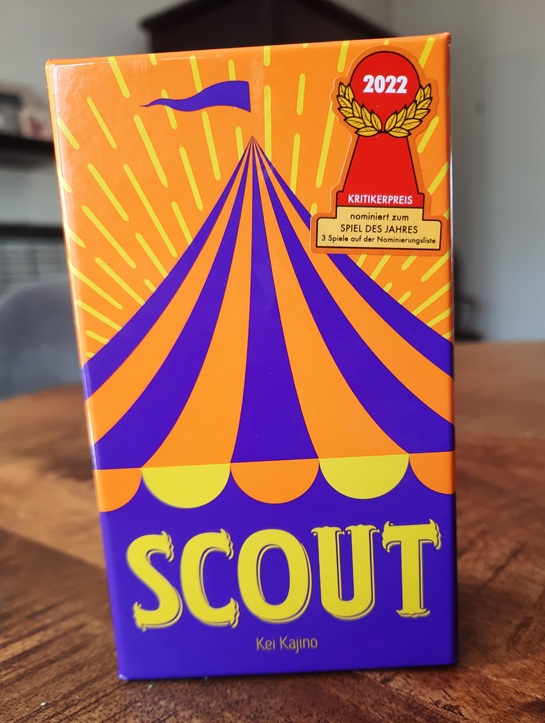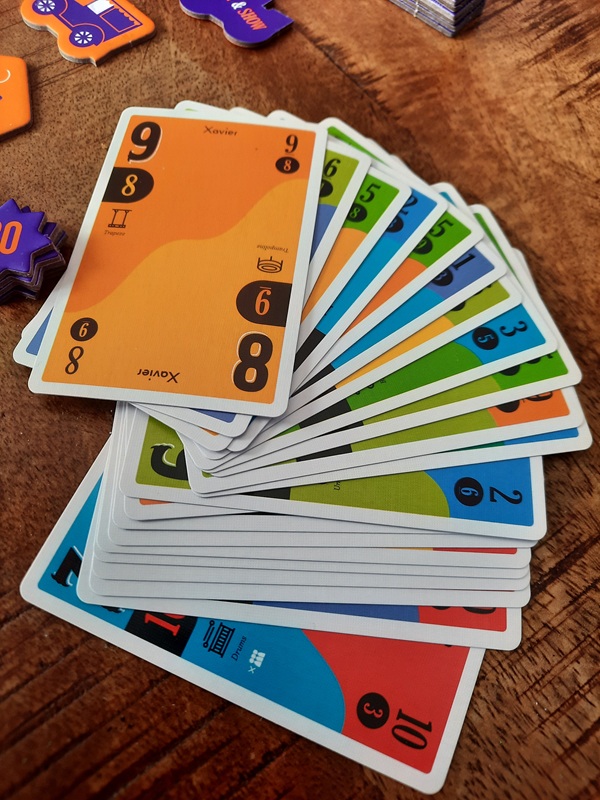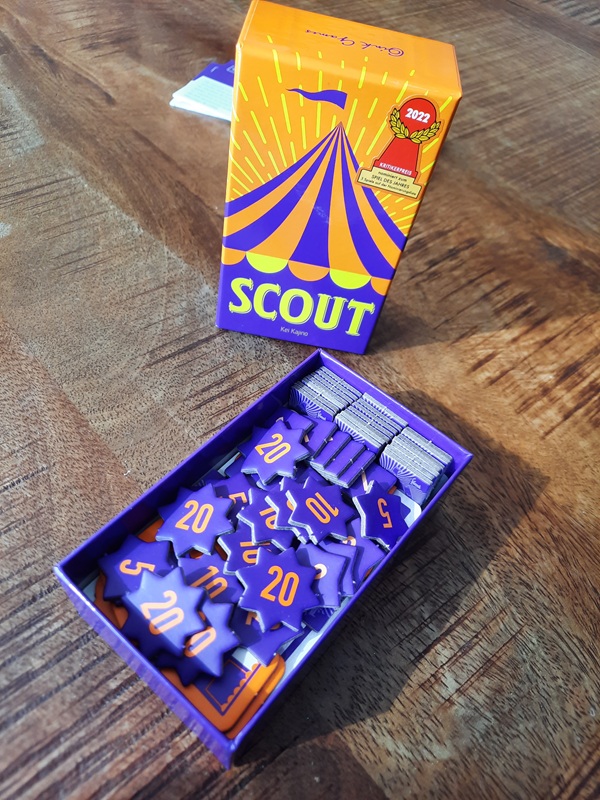
It is far from easy for game makers these days to publish something that stands out in board game land. However, German publisher Oink Games has managed to make their card game SCOUT both an eye-catcher and a hit.
Is it because of the sleek, stylish design, or the popping combination of the colors blue, yellow and orange? Does it have to do with the fact that the game components are of excellent quality and that so amazingly much appears to fit in the compact box? Do people perhaps like the theme? Or is it simply a good game? You can feel it coming: the answer, of course, is that it is a magical combination of all those elements.

Let's start with what type of game it is. SCOUT is a type of trick game, which in this case means that you have to gather sets of cards, but you do so on the principle of "ladder-climbing. In short, you may only play cards from your hand if there are no cards on the table, or if you have a stronger combination than your opponent. For example, if there is a set of cards with the numbers 2 and 3, you can make your move in a number of ways. 2-3 can be defeated by climbing onto the next rung of the ladder, so to speak, and playing 3-4. But you can also knock 2-3 off the table by playing a pair (say 2-2) or by making a longer combination of several consecutive numbers (say 2-3-4). It doesn't get much more complicated than that (so there is no construction like Full House in SCOUT, for one thing).
But SCOUT, in addition to ladder-climbing, has some incredibly fun "tricks up its sleeve. All cards have two number values. For example, a card might have the number ten at the top and the number three as the underlying value. If you then turn that card 180 degrees, the three comes on top. But beware: players can only turn a card over once, at the beginning of the round. And you do not turn over one or more individual cards, but all of your cards in one ... er ... instant.

Why you would possibly want to do that? Well, another particularly nice game technical invention by SCOUT creator Kei Kajino is that you may not change the order of the cards in your hand. For example, you might have a sequence of the following numbers in your hand: 1-2-3-9-4. That nine then throws a spanner in the works if somewhere in the game you would like to play the powerful combination 1-2-3-4, in order to, I'll mention, beat an opponent's on-the-table set of 5-6-7. But because of the "sequencing principle," you are not allowed to quickly fish out that sequence-distorting nine and place it elsewhere in your deck of cards. You will have to get rid of it some other way (for example, if you are the starting player by ending up with that nine, or settle for playing the 1-2-3 sequence at some other point in the game). Another solution might have been to turn over your whole hand at the beginning in one go, which would have suddenly made the number game look completely different.
Pff. Trying to describe it all in such detail, it seems like SCOUT is mainly a party for number crunchers, not to mention math nerds. But it really doesn't turn out to be a matter of constant arithmetic in play practice (though of course you have to be calculating to outdo your opponents with your cleverness).
If you don't have the ability to beat the set on the table with something more powerful from your hand (or do a "Show" action), you may always do a "Scout" action. And that involves taking either the starting card or the one at the end of the preceding sequence into your hand. The great thing is that in this situation you do get to place the card in question wherever you want, and you may even turn it any way you want. And that, dear card game enthusiasts, can yield all kinds of new, interesting and hopefully especially powerful combinations. Oh yes, and I forget to mention that there is a classic win-win situation anyway, as the player who had played the set, and from whom something is taken by a Scout action (or even by multiple Scout actions), is generously compensated with a victory point in the form of a token.
The number of rounds to be played is determined by the number of players. And whoever at the end has managed to collect the most tricks (one point per defeated card) and compensation tokens (minus any point deduction from remaining hand cards), wins the game.

In this review I have tried to give an impression of how the game plays, without actually reviewing all the details in the rulebook (for example, the also possible 'Scout & Show' action has not been explained). But I do hope to have made it clear that SCOUT is an engaging and strategic game. It has been around since 2019 and it is doing extremely well in various rating lists (at the time of writing, it even ranks fifteenth in the BoardGameGeek list of Family Games). The purchase price doesn't lie, but you undeniably get a lot of value and value for your money. That has to do with the quality components already mentioned, but also for the fun that SCOUT provides and the fact that this is not a title that really just sits gathering dust on your game shelf.
In conclusion, a quick word about the theme. The colorful circus tent appears on the front of the game box for a reason. As a player you have to imagine that you are a circus director who is constantly looking for opportunities to put on shows that are more spectacular than those of the competition. If that fails, there is always the option of recruiting, or rather SCOUTing, new talent. And with that, all circus circles are once again complete, allowing us to conclude this game talk with a certain sense of satisfaction.
All that remains is to give SCOUT 7.5 out of 10 points. Herewith.

